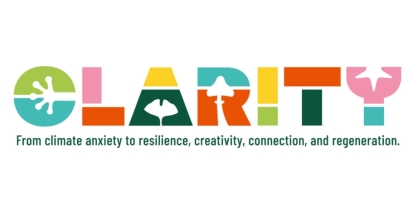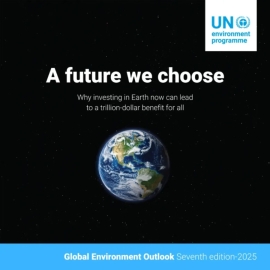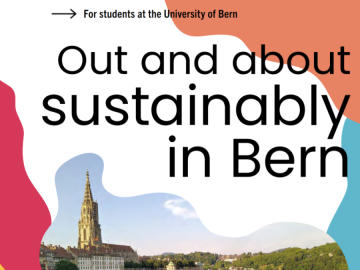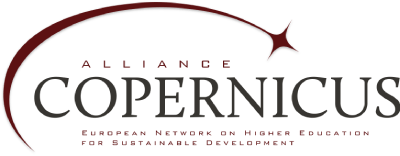#14 11/2024
Barbara Motschiunig
EMAS Coordinator at University of Graz and
role model for sustainability
| _ |
"Together we are stronger and more motivated which is a great value of networks and collaborations. At the same time, we learn from each other." |
Mario Diethart (MD) In 2014, the UN Decade of Education for Sustainable Development (DESD) came to an end and the Sustainable Development Goals (SDGs) had not yet been born. At that time, we shared an office at the University of Graz when we were both working for the Regional Centre of Expertise Graz-Styria. You have since changed departments, but sustainability is still at the top of your agenda. Can you briefly introduce your current position?
Barbara Motschiunig (BM) Thank you very much for the interview. Since 2018, I have been working in the environmental management at the University of Graz, which is part of the Directorate for Resources and Planning. So, I've moved from science to administration.
I am responsible for the environmental management systems EMAS and ISO 14001. This includes both, maintenance and development of the EMAS processes as well as the implementation of various environmental projects. We have set up a sustainability team, with actors from various departments, to get a broader point of view and bring different perspectives and expertise into our environmental management. This consists of interested representatives from academia, administration and student organizations. The collaboration with several teams is of great value for the implementation of measures as well as for the achievement of the goal to become climate neutral by 2040, which the University of Graz has set itself.
I have very interesting and varied working days and work in a great team with committed people at a university that is moving forward.
MD Looking at the ambitious goal to become climate neutral by 2040 – what is your strategy to achieve it and what is the status quo?
BM Yes, I also think that it really is an ambitious and necessary goal. At the University of Graz, we are fortunate to have outstanding scientists in the field of climate research who work on precisely these topics. In cooperation with the Wegener Center for Climate and Global Change, the Directorate for Resources and Planning and the department of Performance and Quality Management, the concept “Institutional Carbon Management” (ICM) was introduced at the university, which was developed by the Wegener Center. In this project, data was collected, a carbon footprint was drawn up and a path for carbon reduction was defined to achieve the goal of climate neutrality until 2040. The Rector chairs the Climate Protection Advisory Board, which is an advisory body involving colleagues from science and various administrative departments.
As we can see in the annual greenhouse gas balance, most greenhouse gas emissions are generated in the areas of energy and mobility. In 2023, total emissions amounted around 12,680 tonnes of CO2 equivalents, with mobility accounting for the largest share (7,200 t CO2eq), followed by energy (3,880 t CO2eq), resources (1,600 t CO2eq) and changes in inventories (40 t CO2eq).
MD Where do you see the biggest challenges when it comes to reducing emissions? Is it energy, mobility, infrastructure? Or perhaps more on the social side such as changing habits of staff and students? Do you have priorities that you are following and examples of measures that you can highlight?
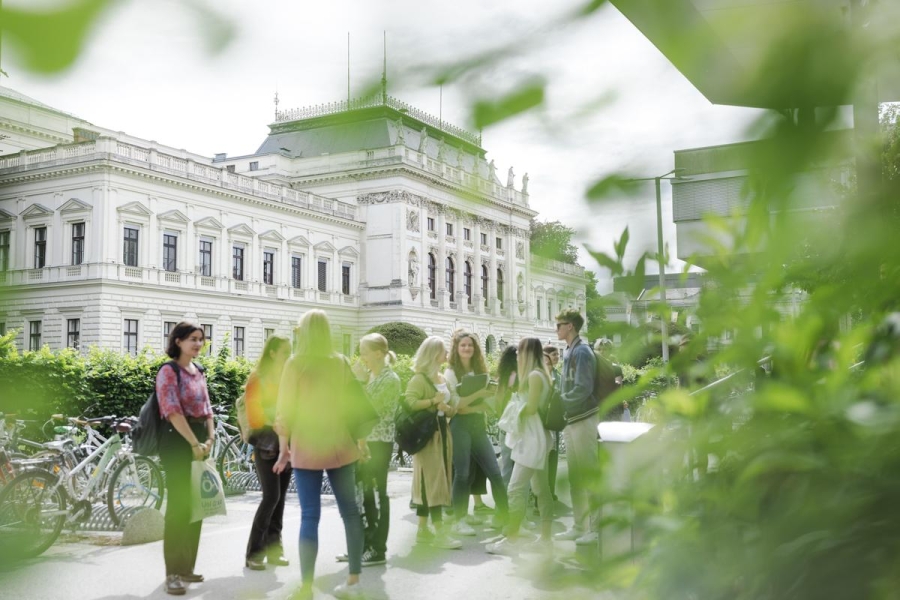 BM I see the challenges in the area of thermal energy, where the University of Graz is dependent on the mix of district heating. New construction projects are already being equipped with geothermal energy, but district heating covers the majority of our heating requirements. In terms of electricity, we have already achieved our reduction target by switching to UZ46-certified green electricity. Furthermore we are also trying to reduce consumption with various measures and become more independent due to the expansion of photovoltaic systems.
BM I see the challenges in the area of thermal energy, where the University of Graz is dependent on the mix of district heating. New construction projects are already being equipped with geothermal energy, but district heating covers the majority of our heating requirements. In terms of electricity, we have already achieved our reduction target by switching to UZ46-certified green electricity. Furthermore we are also trying to reduce consumption with various measures and become more independent due to the expansion of photovoltaic systems.
The area of mobility is another major challenge. The modal split is already very good for both, staff and students. Nevertheless, we are striving for improvements by further expanding the cycling infrastructure, promoting sustainable commuting for staff and trying to improve public transport connections through discussions with the city.
Business trips to conferences or project meetings are clearly a research task. On the one hand, measures are being taken to enable and facilitate online meetings and, on the other hand, to make the necessary travels as sustainable as possible. At the same time, we are particularly dependent on individual behavioral changes in this area. Sustainable mobility is often more expensive and requires more time. In addition, it has often been normal to fly short or medium distances. Since 2022, the University of Graz aims to foster changes in behavior with the “Green Academia Award” – promoting sustainable mobility for international business trips while making academic performance visible.
Now the priorities are further promotion of sustainable mobility, the expansion of renewable energy, such as photovoltaic systems and, of course, simultaneous measures to reduce consumption. Another highlight is certainly the planned ÖGNI certification of the Graz Center of Physics and a comprehensive biodiversity strategy, which is currently being developed. Numerous other measures are being implemented in the “Habitat Campus” project to shape the campus for the future.
To conclude this question, I would like to say that the university is on the right track. Emissions in the area of energy have fallen sharply compared to the base year 2020 (average from 2015-2019) and a reduction is also visible in the area of business travel. The University of Graz, with all the people who are taking action and getting involved, is certainly a pioneer here.
MD You have mentioned the interdisciplinary sustainability team. I suppose that the SDGs are also used as a guideline for the future development of the university. How do you make sure to address these also taking into account non-environmental objectives such as education, cooperation etc.?
BM The SDGs are a good guiding principle, but they are more geared towards the political level, so it is not easy for organizations or companies to apply them in practice. But of course they form an essential basis for goals and measures.
Education is a core task of universities and, clearly, education for sustainable development is also essential. A few years ago, we developed the basic module on sustainable development for students. For staff, we offer internal further training in sustainability, with the three modules “General sustainability”, “Sustainable mobility” and “Sustainability in everyday office life”.
There are several institutes and centers that deal specifically with sustainability issues. These include, for example, the Regional Centre of Expertise (RCE) Graz-Styria, the Department of Environmental Systems Sciences, which offers numerous Bachelor's and Master's degree courses with different foci, such as NAWI-Tech, Management and Geography, and the aforementioned Wegener Center for Climate and Global Change. At the same time, we find sustainability-related teaching and research at all faculties.
The University of Graz is involved in numerous networks and collaborations in the field of sustainability. It is a founding member of “Sustainability4U” and the “Alliance of Sustainable Universities Austria”, and has been a member of the COPERNICUS Alliance and many other national and international networks for many years. Since 2005, the University of Graz has been a member of “Ökoprofit”, an environmental program initiated by the City of Graz, and has been validated with the EMAS and ISO 14001 environmental management systems since 2016.
Many projects are carried out by these networks and are then implemented at the respective universities. The working groups of the Alliance of Sustainable Universities also serve this purpose. I also invite auditors from other EMAS-validated universities to the internal audits, which are carried out annually as part of the EMAS process, in order to strengthen exchange and cooperation.
Together we are stronger and more motivated which is a great value of the networks and collaborations. At the same time, we learn from each other. Personally, I am always very happy to meet people who are heading in the same direction and are shaping the future in a good and sustainable way. It is very motivating and fulfilling to work with people who are committed!
MD We definitely share this feeling! I know that your commitment for sustainability goes beyond your university engagement and that you openly share your experiences and knowledge to promote a future-proof lifestyle. Can you tell us a bit about your recently founded initiative?
BM 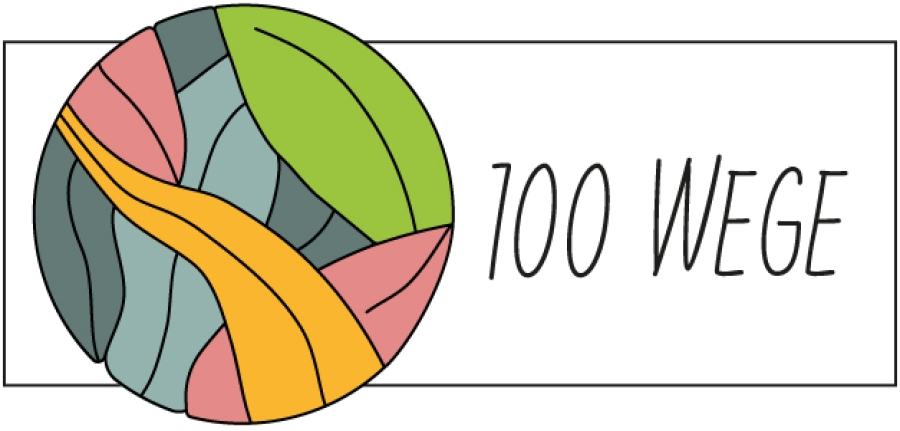 Last year, I founded the association “100 Wege - Verein für nachhaltiges Handeln” together with my sister, and three months ago, we launched our member area “100 Wege und deiner”. This is a place for everyone who wants to engage with the topic of "sustainable living" online.
Last year, I founded the association “100 Wege - Verein für nachhaltiges Handeln” together with my sister, and three months ago, we launched our member area “100 Wege und deiner”. This is a place for everyone who wants to engage with the topic of "sustainable living" online.
As the name suggests, it is important to us to show the 100+ ways to live sustainably and to work towards it. We provide a place to learn from each other, to be on this journey together, to be empowered, and to engage with one's own path.
At the beginning of October, we launched our first program, the ”Alltagscheck”. This is a 9-week program with four modules and an accompanying newsletter and workbook. The online sustainability community is continuously expanded with various content and contributions from us and our network.
We would be delighted if you would take a look and join us. For more information, please visit our website 100 Wege - Verein für nachhaltiges Handeln.
MD What a great initiative! I hope many people will join and benefit from it. Thank you for this conversation!
Contact Barbara Motschiunig:


